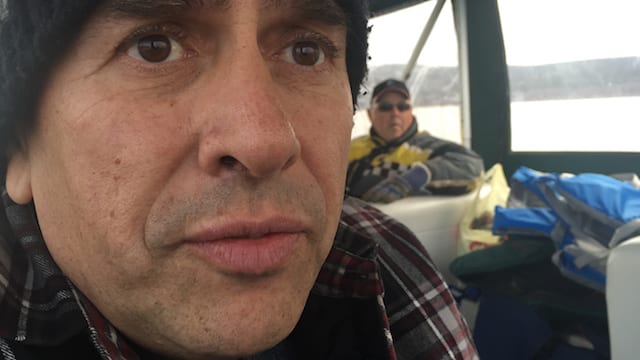
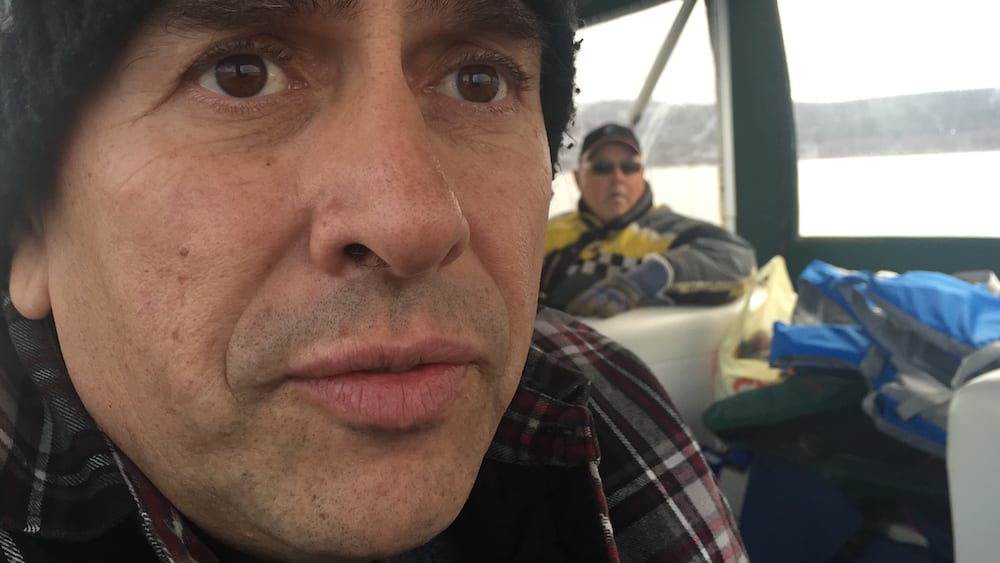
NunatuKavut Community Council President and former Liberal MP Todd Russell went on to the Muskrat Falls site in October 2016. Unlike dozens of others who went on to the project site, Russell and those who accompanied him have never been charged. Photo: TheIndependent.ca.
Editor’s Note: As a journalist with the online publication TheIndependent.ca, Justin Brake followed the land protectors onto the Muskrat Falls site and covered the occupation. He is facing criminal and civil charges from the event.
Justin Brake
APTN News
Land protectors in Labrador facing civil and criminal charges related to the Muskrat Falls resistance are questioning the RCMP and a crown energy corporation’s decisions not to pursue charges against an Indigenous leader who went on to the dam’s construction site during a movement to stop the project in 2016.
They also say that their leader, NunatuKavut Community Council (NCC) President and former Liberal MP Todd Russell, failed to support Southern Inuit who were criminalized after following his lead.
They say throughout the movement to stop Muskrat Falls Russell was in pursuit of separate deals with the federal government and a provincial crown corporation.
A video taken in October 2016 shows a senior RCMP officer telling Russell the federal police were using “discretion” in not arresting or charging him and other NCC members for going on to the Muskrat Falls worksite in Central Labrador despite there being a court injunction in place at the time that prohibited them from doing so.
Watch: Video of RCMP talking with NCC President Todd Russell
In the Oct. 18, 2016 video shot by TheIndependent.ca, Staff Sgt. Sandy Goudie with the RCMP in Happy Valley-Goose Bay can be seen speaking with Russell after the Southern Inuit leader and several NCC members returned from a boat trip to Muskrat Falls, where they went on to the site multiple times to assert what they said at the time was their Aboriginal right to be on their ancestral land.
Goudie warns Russell and NunatuKavut Councillor and Elder Jim Learning, who accompanied Russell on to the site, that the NCC members could be charged both civilly and criminally.
The officer says there is a “criminal element of the breach…of being there [on the site],” and that the RCMP “used our discretion in our approach here.”
In a Facebook live stream report by TheIndependent.ca of Russell’s visit to the site, Scott Morrison, head of security for Nalcor, told the visitors that the RCMP “are involved”.
Morrison also attempted to hand Russell a copy of the injunction, but Russell refused, saying “I have no court injunction and I haven’t seen a court injunction.”
Following the exchange with Goudie in the video, Russell acknowledges that he knew of the injunction’s existence but said he wasn’t aware of its entire substance.
“I haven’t seen the injunction—I’ve seen some parts of it, but I’ve never been served a copy of the injunction. I’m unaware of all of its contents,” he said.
The day prior, Oct. 17, Russell publicly destroyed a copy of the injunction at a press conference during which he announced the NCC would commit bodies and resources to the growing movement to stop Muskrat Falls ahead of reservoir flooding.
After being handed a copy of the court order by an NCC member, Russell said “I suppose this is what we can do with injunctions.”
He then tore the document into pieces and laid it on the table in front of him as those in attendance applauded.
Two years later, as more than 20 land protectors—including NCC members—continued to fight civil and criminal charges related to the Muskrat Falls resistance, Russell and those who accompanied him on to the Muskrat Falls site that day still have not been charged or summonsed to court to defend their actions.
NunatuKavut put politics ahead of values, say current and former members
Several current and former NCC members say the incident, and others around that time, indicate Russell was more concerned with striking the deals than he was about the environment or delaying reservoir flooding until concerns around methylmercury were addressed.
Denise Cole, a land protector and member of the Southern Inuit community, told APTN News she and others feel they were “used to move forward a political agenda to get to a benefits agreement table, to get to a negotiations table around acknowledgement and land claims that will eventually come to be.”
In December 2017 the NCC announced a deal with Muskrat Falls proponent Nalcor Energy, the crown corporation building the dam.
Then, in August 2018, the organization held a joint press conference with federal Crown-Indigenous Relations Minister Carolyn Bennett to announce NunatuKavut and Canada will enter into talks toward the recognition of Southern Inuit Indigenous rights and self-determination, something Russell and many in Labrador have long fought for.
The Nalcor deal includes a promise from the NCC that it will no longer oppose Muskrat Falls or any other Nalcor projects over a six-year time period.
Southern Inuit land protectors describe how Russell became involved in the 2016 grassroots-led movement to stop Muskrat Falls after the movement gained significant momentum.
They also say that through his actions he led Southern Inuit to believe they could follow his lead, and that he then failed to publicly support land protectors after they were criminalized for defending their lands, traditional foods and way of life.
Kirk Lethbridge, a land protector and NCC member who has worked with Russell for decades as the organization—previously the Labrador Metis Nation—fought for Aboriginal rights and recognition, was the person who handed Russell a copy of the injunction on Oct. 17.
Lethbridge told APTN that when Russell tore it up he made “all of Labrador feel 10 feet tall,” and that Lethbridge and others felt “empowered, emboldened, braver and stronger.”
Lethbridge said Russell sent a clear message to his members and others that the injunction was not to be respected.
“Then, a few short days later, it means nothing and those people are thrown to the wolves, given a lawyer that will help them plead guilty,” he said.
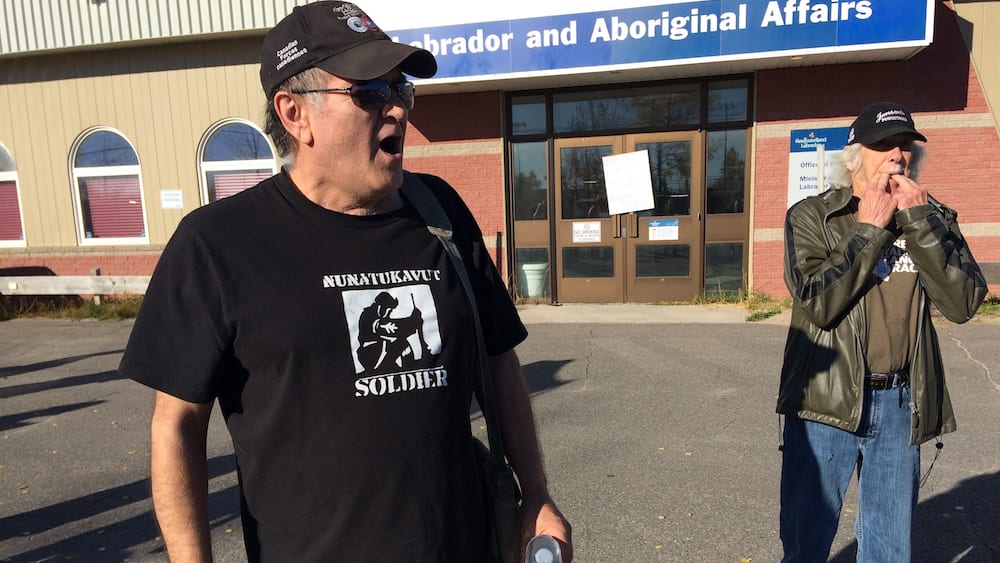
Kirk Lethbridge (pictured here at an October 2016 rally outside the provincial Labrador and Aboriginal Affairs office in Happy Valley-Goose Bay) said Todd Russell made he and others feel “empowered, emboldened, braver and stronger,” after destroying a copy of the court injunction on Oct. 17, 2016. Photo courtesy of TheIndependent.ca.
On Oct. 22 many NCC members joined the occupation of the Muskrat Falls site, which lasted until Oct. 26.
Lethbridge said the NCC offered some of its members legal support, but that he declined because he had lost trust in Russell.
He said Russell tried to approach him about the NCC helping with his legal representation, but that he “personally could not trust anything legal or political from NCC’s leader.”
Lethbridge and other Southern Inuit land protectors have told APTN that Russell hasn’t shown up to support them at any of their court hearings over the past two years.
Reflecting on the day Russell destroyed the injunction, Port Hope Simpson fisherman and former NCC member Dennis Burden told APTN Russell had joined the grassroots movement “for all the wrong reasons.
“He gave us some hope, that we didn’t have to abide by those injunctions. And if we had our group stand with us we could have made a difference,” Burden added.
Many who joined the Indigenous-led occupation days after Russell went on to the project site don’t feel they’ve done anything wrong in responding to what they say is a threat to their traditional foods and ways of life.
And with Russell and the NCC—which represents 6,000 people in Labrador—on his side, Lethbridge said he felt protecting traditional foods against projected methylmercury contamination, and saving the Lower Churchill River, was achievable.
“It felt tremendous, like oh my god we’re going to save this river, we’re going to stop this destruction, we’re going to stop the poisoning of the land and the water — we’re going to win,” he recalled.
“We had the might, the power, the numbers, the finances, the leadership of NunatuKavut with us on the front lines.
“We felt huge and we didn’t feel so alone.”
Elder resigns seat on NunatuKavut council
Learning, a land protector who has been arrested and incarcerated multiple times for resisting Muskrat Falls, told APTN last week he resigned his seat on the NCC council earlier this year after realizing Russell’s thinking didn’t align with his values as a Southern Inuk.
Russell was “moving towards an agreement with Nalcor,” Learning said, speaking of the period of time between the Muskrat Falls occupation and December 2017, when Nalcor and the NCC inked the deal that will see the crown corporation transfer $8 million to the group over six years.
For years the NCC considered Nalcor an adversary of the Southern Inuit, who have maintained since prior to the project’s sanctioning in 2013 that they were never adequately consulted.
NunatuKavut unsuccessfully challenged the Muskrat Falls project twice in federal court and in 2013 launched a direct action campaign during which Russell, Learning and eight others were arrested after slowing traffic headed for the project site.
Learning, who is living with cancer, launched a hunger strike while in custody and was released on the sixth day.
They were charged with violating an injunction in place at the time but were later successful in having it overturned in the provincial court of appeal.
Those charges were dropped in January 2015.
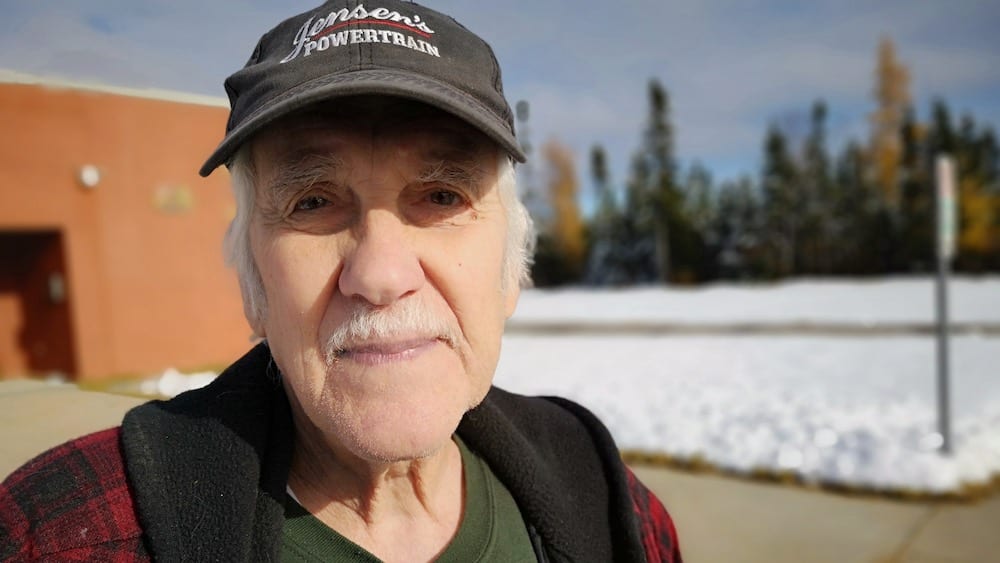
Elder Jim Learning was instrumental in the movement to stop Muskrat Falls, but resigned as an NCC councillor after realizing Todd Russell’s values and direction didn’t align with his. Justin Brake/APTN photo.
The NCC was relatively quiet from that period until the broad-based movement to halt flooding reached a critical point in October 2016.
It was the grassroots occupation of the site that finally got Russell to the table with Newfoundland and Labrador Premier Dwight Ball and other Indigenous leaders from the province, said Learning, who sat in on the emergency marathon meeting at Confederation Building in St. John’s that began Oct. 25 and concluded in the early morning hours of Oct. 26.
“Todd blew me away, he just wouldn’t say anything. I said, this isn’t right — he’s been protesting against it. He has free reign [because] we have no land claim, recognition or acceptance [by Canada].
“But I realized after there was the rub — that’s what he was looking for.”
Learning said he “laid it on thick” and “was vicious” with Ball and the Labrador MHAs at the meeting.
“How dare you poison our food?” he recalled telling the political leaders, adding they would be voted out in the next election because people in Labrador don’t accept the threats and risks associated with Muskrat Falls.
Learning said “everything stopped” when he gave his speech, and that when he was done he left the room.
He said Ball followed him out into the hallway, where the two had an exchange.
Learning said Ball assured him that if Muskrat Falls would result in mercury contamination of traditional foods, “we will stop the project.”
He said Russell “wasn’t strong enough” that evening, and that the leader owed his seat at the table to the land protectors whose occupation of the Muskrat Falls site forced the meeting.
Hours later Ball and the Indigenous leaders announced a deal that included the creation of an Independent Expert Advisory Committee to study and make recommendations to government on how best to mitigate methylmercury.
In the months that followed the NCC entered into negotiations with Nalcor.
Learning said he was not included in the negotiations and doesn’t know if all of the relevant information leading up to the deal was conveyed to him and the other councillors.
The deal, which the NCC and Nalcor have called a “Community Development Agreement,” was struck in December 2017.
Learning said he gave a 10-minute speech at the announcement of that agreement in opposition to the deal.
Days later he announced his intentions to resign, which he formalized in a letter to the NCC last August.
Russell did not respond to multiple interview requests for this story and the NCC did not respond to a request for a copy of the agreement.
But a copy obtained by APTN reveals that in addition to the money Nalcor will transfer to the organization each year for specific infrastructure, education and cultural programs, Nalcor also reserves the right to audit NunatuKavut’s financial records to ensure the money is being spent for those purposes.
It also commits the NCC to ending its resistance to Muskrat Falls and future projects that might arise during the term of the agreement.
“NCC will not organize or initiate conduct that is intended to or which prevents, delays, hinders or interferes with the construction, operation or decommissioning of any Nalcor project covered by this agreement,” the document reads.
It also frees the NCC from liability if any of its members violate the terms of the agreement “not under the direction or instruction, or as agents for, NCC.”
The agreement also mandates Nalcor to negotiate on future projects in Labrador, initiatives for renewable energy generation, workplace environment and cultural accommodations and training, employment and business opportunities.
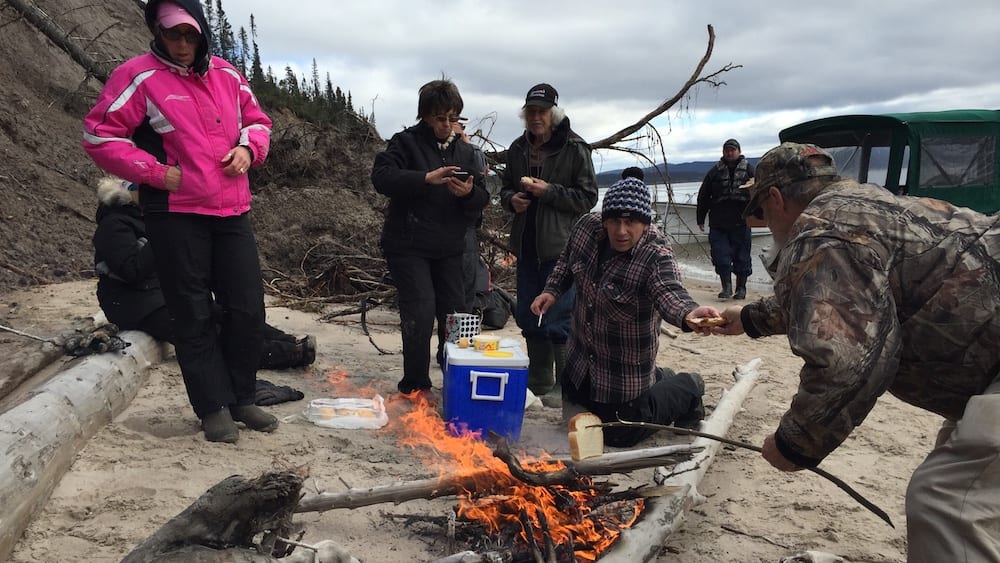
Todd Russell and members of the NCC built a fire on the Muskrat Falls construction site on Oct. 18. 2016. They went on to the site three times that day but have never been charged for their actions despite there being an injunction in place at the time. Photo courtesy of TheIndependent.ca.
The NCC does not have a land base formally recognized by Canada but has presented the federal government with land use study documents claiming large portions of Central and Southern Labrador.
In August, Russell and Crown-Indigenous Relations Minister Carolyn Bennett announced that Canada would begin the negotiations process with NunatuKavut leadership.
Russell said at the announcement his people will “once again have decision-making power over our lands and resources.
“It means a greater ability to deliver programs and services like healthcare and education that are aligned with our values and way of life. It means that the government’s projects can only happen on our lands with our consent and participation.”
Much of the land the NCC claims is theirs ancestrally dating back hundreds of years overlaps with land the Innu have occupied for thousands of years and have claimed in their own negotiations with Canada.
Renouncing NunatuKavut membership
Cole, one of 15 land protectors currently on trial to defend against civil contempt charges for violating an injunction after going on to the Muskrat Falls site to do ceremony, is Southern Inuit.
But she has not affiliated with the NCC for the past five years.
“Back in 2013 it became very clear to me that the stand that NunatuKavut was taking against Muskrat Falls was politically driven,” she said.
“It wasn’t about protecting the environment as much as it was about staking a claim.
“It felt like they were looking to claim land ownership so they could put it up for sale,” Cole recalled.
While Russell and the NCC were defending what they say is their ancestral land from the destruction of Muskrat Falls, Cole points out the organization was simultaneously making deals with mining companies.
In June 2013, two months after Russell and other NCC members were arrested while demonstrating outside the Muskrat Falls site, the NCC signed a “Community Participation Agreement” with Alderon Iron Ore Corp. related to the Kami Iron Ore Project in Western Labrador.
Cole said she tried to bring forward her concerns about the environment to leadership but felt “they were never really addressed.”
So she asked to be removed from the NCC’s membership list.
“I could no longer support them,” she said, explaining NCC leadership’s actions did not fall in line with her values as an Indigenous person.
“I’ve always been about land protection and about our responsibilities to preserve the land and the waters and the culture, and I didn’t feel we were on the same page anymore.”
Cole said she feels, after watching the NCC “position itself in 2016 around the Muskrat Falls resistance, that they’ve used us.”
She said while the Southern Inuit have “worked hard with their research” toward a land claim, and while “there are some great people” within the organization, “overall the secrecy is a colonized move [and] not an Indigenous value.”
Cole isn’t the only land protector who relinquished membership in the organization in recent years.
Several years ago Burden burned his NCC membership card.
Now facing civil and criminal charges related to the Muskrat Falls occupation, Burden said he had become “too ashamed, embarrassed and angry to remain a member” after the Labrador Metis Nation sold a fishing boat outside of membership despite having “some of the greatest fishermen on the planet on the coast of Labrador.”
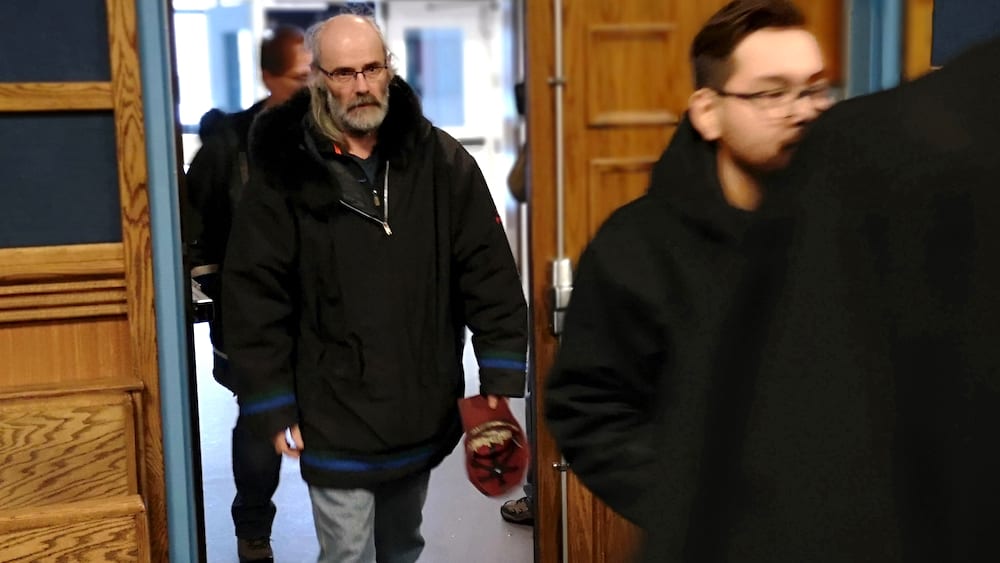
Dennis Burden attends provincial Supreme Court in Happy Valley-Goose Bay in October 2018. Justin Brake/APTN photo.
Burden, who has been resisting Muskrat Falls since before the project’s sanctioning, said he planned to return to the organization someday, and that Russell’s leadership during the fall 2016 Muskrat Falls resistance gave him “a little bit of hope.”
Though in the back of his mind, he said, “I kind of knew this was about land claims and dollars.”
Many Southern Inuit, who until recently identified as “Metis” based on an interpretation of the term as signifying mixed European and Indigenous ancestry, have worked hard to revive or strengthen elements of their ancestors’ culture.
But politically the NCC is headed down the wrong path, said Burden.
“I do not believe that people should be able to play the Indigenous card without respecting Indigenous values and teachings. You just can’t run and cry, ‘Our lands, our lands, protect our lands,’ and then change when you get what you want.”
Uneven application of justice, say land protectors
Cole said the circumstances around Russell’s actions from October 2016 and the subsequent absence of any legal repercussions, coupled with what she feels is the Southern Inuit leader’s lack of support for his people who are fighting charges after following in his footsteps, together paint a picture of injustice and colonialism.
She said Nalcor’s decision not to pursue civil litigation against Russell and the NCC members who accompanied him on to the Muskrat Falls site on Oct. 18, 2016 demonstrates that the province, through a crown corporation, is “picking and choosing who they’re charging.”
Cole said Russell’s tearing up of the injunction “was a direct message to everyone else that not only should we ignore the injunction, [but also] that he would support us if we broke the injunction.
“I think the fact that Todd Russell has never had any charges against him for breaking the injunction is ridiculous in consideration to the amount of evidence that shows he did,” she added.
She said that the events of October 2016, followed by the NCC’s agreement with Nalcor, are a “real shame”.
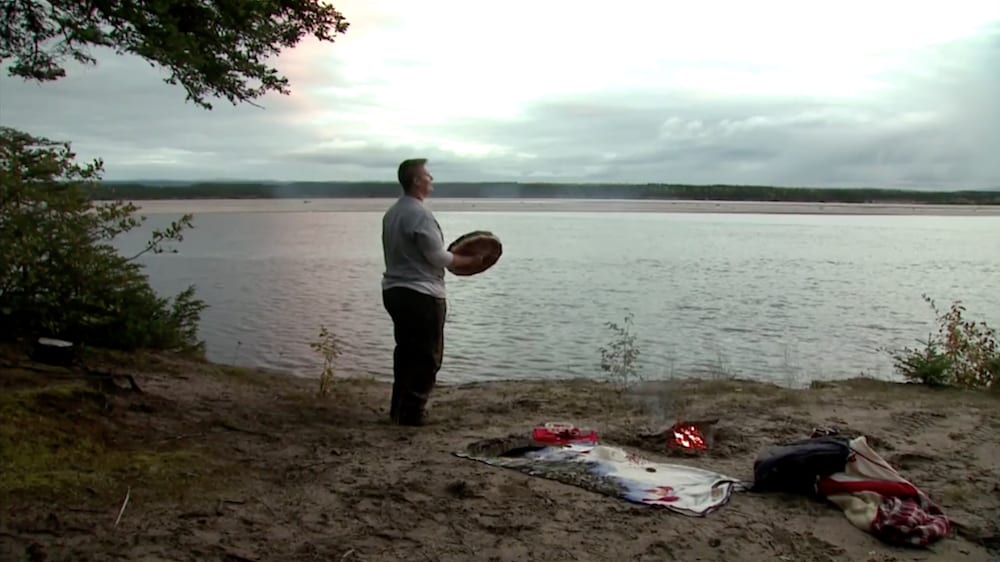
Land protector Denise Cole said she ended her membership with the NCC in 2013, after feeling the organization’s opposition to Muskrat Falls “wasn’t about protecting the environment as much as it was about staking a claim.” Trina Roache/ATPN file photo.
“Our leadership should have more Indigenous values than that, and their culture is supposed to mean more than that,” she said.
Lethbridge, who faces a potential criminal record for following Russell’s lead in disrespecting the injunction, said it’s no coincidence Russell and the NCC’s decision not to publicly support its members who are land protectors was followed by the deal with Nalcor and a commitment from Canada to finally negotiate a land claim.
“It just wrangles me that the elite and the elected seem to be able to walk away scot-free,” he said, “when the frontline people are the ones that are still facing the judge.”
APTN asked Nalcor, which is responsible for bringing allegations of civil contempt against individuals it believes violated the injunction, to explain why it did not charge Russell and the NCC members who accompanied him on to the Muskrat Falls site.
“Given there are ongoing proceedings before the Courts, Nalcor will not be commenting on this matter while it is before the Courts,” spokesperson Karen O’Neill responded in an email.
Similarly, the RCMP said it “would not be appropriate to comment on specific matters that may influence those matters before the court.”
They did say, however, that “in matters of civil unrest the RCMP uses a measured approach assessing each situation and its circumstances in determining a response.”
The day prior to Russell and the NCC members’ visit to the Muskrat Falls site, RCMP officers arrested eight people–most of them Indigenous women who feared the loss of their country foods–who were blocking the entrance to the project site along a highway.
Those who went on to the site after Russell and the NCC’s trip to Muskrat Falls, as well as those who demonstrated outside the site—including elders and youth—have been charged by Nalcor and the RCMP for allegedly violating the injunction.
“The RCMP maintains a balanced and unbiased approach to these matters respecting the rights of all involved,” the federal police concluded in their statement.









